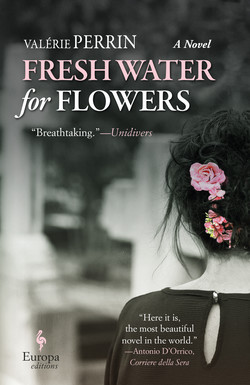Читать книгу Fresh Water for Flowers - Valérie Perrin - Страница 29
На сайте Литреса книга снята с продажи.
24.
You must learn to be generous with your absence to those who haven’t understood the importance of your presence.
ОглавлениеDeath never takes a break. It knows neither summer holidays, nor public holidays, nor dentist appointments. Slack periods, mass departures, the Highway to the Sun, the thirty-five-hour working week, paid leave, the festive season, happiness, youth, heedlessness, lovely weather—it couldn’t care less about all that. It’s there, everywhere, all the time. No one really thinks about it, or they’d go mad. It’s like a dog that’s forever weaving around our legs, but whose presence we only notice the day it bites us. Or, worse, bites a loved one.
There’s a cenotaph in my cemetery. It’s on avenue 3, Cedars section. A cenotaph is a memorial erected over a void. A void left by someone who died at sea, on a mountain, in a plane, or in a natural disaster. A living person who just vanished, but whose death seems indisputable. The cenotaph in Brancion no longer has a plaque. It’s very old and I’ve never known in whose memory it was erected. Yesterday, by chance, Jacques Lucchini told me that it was put up in 1967 for a young couple who disappeared in the mountains. Before getting back into his hearse, Jacques said to me, “Youngsters who went mountain climbing, and apparently fell.”
I often hear, “Losing a child is the worst.” But I also hear it said that the worst is not knowing. That there’s something more horrendous than a grave, and that’s the face of a missing person plastered across posts, walls, shopwindows, newspapers, a TV screen. Photos that age, but the face they depict never does. That there’s something more terrible than a funeral, and that’s the anniversary of the disappearance, the TV news, the releasing of balloons, the silent tribute march.
A few kilometers from Brancion, a child simply vanished thirty years ago. His mother, Camille Laforêt, comes to the cemetery every week. The town hall made an exception and permitted her a tomb on which she could have inscribed the name of her missing son: Denis Laforêt. There’s no proof that Denis is dead. He was eleven when he just vanished between his classroom and the bus stop opposite his school. Denis had left class an hour earlier than his friends. He was supposed to go to a study period. And then nothing. His mother looked everywhere for him. As did the police. Every family in the area knows Denis’s face. It’s “the missing child of 1985.”
Camille Laforêt has often told me that having Denis’s name inscribed on that false tomb saved her life. That having that name engraved on the marble kept her between the possible and the impossible: imagining that he might still be alive, somewhere, alone, without love, suffering. And every time she pushes open my door, sits at my table, has a coffee, says to me, “How are you, Violette?” she adds, “There’s worse than death, there’s disappearance.”
As for me, I’d really got used to Philippe Toussaint’s disappearance. I’d never have wanted to know.
I open the envelope containing the speech Julien Seul has written for his mother. The one he’ll read on the day he finally agrees to place her ashes at Gabriel Prudent’s tomb. A cursed meeting, that of those two. If Irène Fayolle hadn’t met Gabriel Prudent, Julien Seul would never have set foot in my cemetery.
Irène Fayolle was my mother. She smelled lovely. She wore the perfume “L’Heure bleue.”
Although born in Marseilles on April 27th, 1941, she never had a Midi accent. She didn’t have the South in her genes. She was reserved, distant, spoke little. She always preferred the cold to the heat, skies that blocked out the sun. Even her physical appearance singled her out. She had a pale complexion, freckles, and blond hair.
She liked beige. I never saw her wearing colorful clothes or sandals, apart from a yellow dress in a photo taken on holiday in Sweden, before I was born. A garment that’s like a wrong turn.
She loved English teas. She loved the snow. She took photos of it. In our family photo albums, there are only pictures taken in the snow.
She rarely smiled. She was often lost in her own thoughts.
By marrying my father, she became Madame Seul. Since she felt as if she were making a spelling mistake by not writing “Seule,” to agree with “Madame,” she stuck to her maiden name.
She only had one child, me. For a long time, I wondered whether it was me or our surname that made my parents stop wanting to reproduce.
First, she was a hairdresser, then she became a horticulturist. She created different varieties of rose that thrived in winter. Roses in her own image.
One day, she told me that she liked selling flowers even when they were for decorating tombs. That a rose was a rose, and whether it was destined for a wedding or a cemetery was of no importance. That on all florists’ windows it said, “Weddings and funerals.” That you couldn’t have the one without the other.
I don’t know whether she was thinking of the unknown man she’d chosen to spend eternity with, on the day she said that to me.
I respect her choice, just as she always respected my choices.
Rest in peace, dear Mom.
